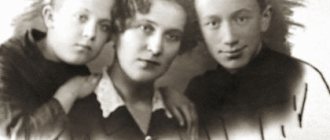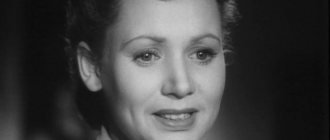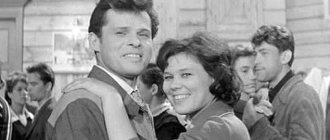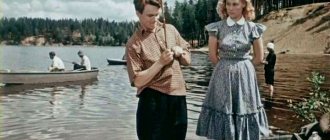Svetlana Smirnova's childhood and family
Svetlana was born near Kazan in the small village of Yudino.
I visited the city quite rarely because of the classic Russian roads, especially during the rainy season, when they turned into a swamp. The actress admits that it is difficult to remember her childhood years: in their free time, men drank, women grew old early, children in most cases repeated the fate of their parents, in rare cases they attempted to change their fate by leaving the village. In the third grade, Svetlana began dancing; her passion led her to a drama club, which was organized at the House of Pioneers. It was from this moment that her life was filled with bright colors, she was really lucky with her leader, Yuri Leonidovich Kalinin took a direct part in her acting career. Over time, the circle turned into a theater in which the guys showed performances and earned the first money in their lives. In the summer, the team made a movie with the funds raised.
Actress Svetlana Smirnova was born in the province, where she spent her childhood
At the age of 13, Svetlana received her first title, which she is proud of to this day: “Honored Artist of the Pioneer Theater “Ryabinka”, the reason was the role of Juliet.
Love on the ski track
They say that from that moment Lidochka began to consider herself an orphan: she never saw any special affection from either her aunt or uncle, she did not remember her parents, so the girl chose to move away from her relatives.
She decided to achieve fame at all costs so that at least strangers would love and admire her. Smirnova went to study at the ballet school at the Bolshoi Theater. But after receiving her certificate, she initially had to choose a more mundane profession. The girl entered the Industrial and Economic College. And after college, already working in the aviation industry department, she applied to the aviation institute.
Lidia Smirnova on a ski trip. 1958 Photo: RIA Novosti/S. Mishin
But a year later, Smirnova realized that she was too far from aviation, took the documents and took them to the theater institute, or rather, three theater institutes. And I got into all three. And I racked my brains for a long time about which one to choose. Lidochka decided to study in the studio at the Chamber Theater. Not because she was a fan of this theater, but because the studio was located not far from her home.
To stay in shape after ballet school, Lidochka went jogging every day and skied in the winter. So on one ski track she met her first love - journalist Sergei Dobrushin . Soon the lovers exchanged rings.
Article on the topic
People's Dunya. A failed lawyer and great composer Isaac Dunaevsky Sergei loved his Lidochka so much that he turned a blind eye to all her many hobbies. Moreover, she had affairs, but she flatly refused to go to her boyfriends.
Thus, composer Isaac Dunaevsky was in love with Smirnova; he became inflamed with passion for the young actress while working on the film “My Love.” Cinema old-timers say that every month on the 13th, Dunaevsky sent the object of his passion huge bouquets of flowers and gifts, wrote letters, and sent telegrams. According to rumors, he even asked her to marry him. But Smirnova refused. Then the composer retreated. And after some time he rang the doorbell of her apartment. Dunaevsky handed the stunned Smirnova a bouquet of flowers and said that his love for her had passed.
Lidiya Smirnova bakes pies in her kitchen. 1958 Photo: RIA Novosti/S. Mishin
The husband was already hoping that his Lida would finally become a faithful wife at home. But it was not there. During the next filming, Smirnova fell in love with the captain of the ship. For her it was a holiday romance, but for the captain it was true love. Therefore, he followed the actress to Moscow and demanded that she leave her husband. Smirnova and the captain turned away from the gate. After all, loving Seryozha was waiting for her at home.
But Smirnova herself did not wait for Serezha. During the war in 1941, he went to the front and did not return - he went missing. Until her last days, Lydia was sure that Seryozha was alive, because he promised her that if he was wounded and became disabled, he would no longer come to her.
Article on the topic
Conversations about life. Friendship, love and loneliness of Lydia Smirnova
Education of Svetlana Smirnova: Institute
The head of the theater predicted a brilliant future for her in cinema, insisting that she should enter the theater.
Svetlana herself dreamed of becoming an actress, and the support of a person who was an authority for her gave her confidence. After graduating from school, the girl goes to Leningrad. The first time living in a big city was accompanied by an overwhelming feeling of fear. But the actress clearly remembers the first sign that made her understand that everything would work out for her: she heard church bells immediately after her arrival. The ringing of bells still symbolizes good luck for her, especially before the most significant events in life. Svetlana became a student at the Leningrad State Institute of Theater, Music and Cinematography on the course of Z.Ya. Korogodsky.
The actress prefers to refrain from commenting on her first marriage. They met their first husband in their second year, and after a short romance they decide to start a family. Svetlana received her diploma in the last month of pregnancy and gave birth a week after the ceremonial presentation.
Smirnov Vladimir Nikolaevich
Smirnov Vladimir Nikolaevich Born on March 9, 1937. Died July 22, 2002.
Very little is known about Vladimir Smirnov, despite the several dozen films in which he starred. In films, he was used more as an actor in supporting roles and episodes; no articles were written about him, no interviews were taken with him, and even his former colleagues in the acting workshop cannot remember anything significant about Smirnov. Alas, this is the lot of many ordinary artists of the Soviet screen, who, having devoted years of honest service to their profession, ended their lives in complete oblivion and, sometimes, loneliness. This was probably the case with Vladimir Smirnov, although he continued to act occasionally almost until the end of his life. But it was never possible to find out how his life ended, under what circumstances. Neighbors in the building where he lived refused to say anything about the actor, adding even more mystery to his death.
Vladimir Smirnov was born in Moscow in the family of metro worker Nikolai Dmitrievich Smirnov (1907–?) and seamstress Evdokia Ivanovna Smirnova (1911–?).
Having left the walls of school No. 7 LONO in 1954, Vladimir became a student at the Moscow Geological Exploration Institute named after S. Ordzhonikidze, from where, after completing the first year, he took his documents and entered the acting department of VGIK, in the workshop of Boris Vladimirovich Bibikov. From the very first courses, he began to appear in small episodes in films (“Carnival Night”, “Ekaterina Voronina”), preparing a good springboard for his future acting work.
After graduating from VGIK in 1960, Vladimir Smirnov immediately began to actively act in film. He played mainly the roles of his contemporaries: workers, collective farmers, drivers, people in uniform. The actor’s courageous appearance, restraint, expressive gaze, sincerity, and charm aroused the sympathy of the viewer and made him believe his characters on the screen. The most notable of them: Sashka (“Eagle Island”), Egor (“Flood”), Fomintsev (“Early in the Morning”), Shelagin (“Red Tent”), Pavel Krylatykh (“Parachutes in the Trees”), owner of a safe house ( “Seventeen Moments of Spring”), Dyatlov (“Don’t set traps for the devil”), Alexey Pavlovich (“Reward (posthumously)”). Smirnov played his only major role in 1976 at the Sverdlovsk Film Studio in Oleg Nikolaevsky’s film “Meet Me at the Fountain,” appearing in the image of the good-natured hard worker Sergei Dolganov, who is fond of building fountains. This picture did not compare favorably with other, more successful films, but it remained one of the most significant in Smirnov’s acting arsenal.
As for the creative fate of Vladimir Smirnov, everything is more or less clear here. From April 10, 1961 to June 30, 1999, he worked on the acting staff of the M. Gorky Film Studio. But how his personal life turned out is unknown. According to the documents I found, he was single and childless. It is known that he had an older brother, Valentin, but I was never able to find him or anyone close to him.
The urn with the ashes of Vladimir Smirnov was buried in the columbarium of the Nikolo-Arkhangelsk cemetery.
Films and roles:
1956: “Carnival Night” (musician); 1957: “Ekaterina Voronina” (port worker); 1960: “A Simple Story” (Chauffeur); 1961: “When the trees were big” (Vitya, driver), “Mishka, Seryoga and I” (builder), “Eagle Island” (Sashka); 1962: “Flood” (Egor); 1963: “They conquer the sky” (pilot), “On duty” (co-pilot), “Street of Cosmonauts” (Uncle Stepan); 1964: “Believe me, people” (driver), “There lives such a guy” (a guy at a dance), “Zero Three” (Elmar), “The Adventures of Tolya Klyukvin” (driver); 1965: “People remain people”, TV (Pokatilo), “Early in the morning” (Fomintsev), “Man without a passport” (Klevtsov); 1967: “Give me your paw, Friend!” (doctor), “Direct Line” (Smirnov); 1969: “Red Tent” (Shelagin); 1970: “The Return of “Saint Luke”” (Ievlev), “Red Square” (driver), “About Friends and Comrades”, TV (Sobol, anarchist); 1971: “In the old bus”, film (accordionist), “Property of the Republic” (telegraph operator); 1972: “Red Sun”, TV (legless accordion player), “Parachutes in the trees” (Winged); 1973: “Matters of the Heart” (Sergei), “Seventeen Moments of Spring”, TV (owner of a safe house); 1974: “Who will answer?”, film (traffic police investigator), “About incredible events”, film (traffic police officer), “Pyotr Martynovich and the years of great life” (pilot); 1975- “Flammable Dream”, film (restorer), “The Lost Expedition” (Gubenko); 1976: “Meet me at the fountain” (Sergei Dolganov), “Golden River” (Gubenko); 1977: “Red Chernozem” (Semiverstov), “Duel in the Taiga” (Ignatiy Makarovich); 1979: “Pirates of the 20th Century” (first mate); 1980: “Petrovka, 38” (investigator); 1981: “Carnival” (neighbor in a new house), “Don’t set traps for the devil” (Dyatlov), “Facts of the past day” (Tuchin); 1983: “Proceed with liquidation” (Sokolov, police officer), “It was the fourth year of the war...” (Burenkov); 1984: “Very Important Person” (collective farm chairman); 1985: “Attention! All posts" (precinct); 1986: “Bridge” (role), “Award (posthumously)” (Alexey Pavlovich Starikov); 1987: “Katenka” (officer on the train); 1988: "Aboriginal" (captain); 1991: “Unforeseen Visits”, TV (Kuzovlev), “Until the Thunder Strikes” (Kuznetsov), “Seventeen Left Boots”, TV (ep.), “Damn Drunkard” (Nikita); 1992: “Three days outside the law” (Efim); 1993: “Alphonse” (Mikhalych, watchman), “Abyss (seventh circle)” (OVIR employee); 1995: “Under the sign of Scorpio”, TV (watchman); 1996: “Return of the Battleship” (Odessa); 1997: “The Thief” (man at the station); 1998: “Essay for Victory Day” (fitter); 2000: “Truckers”, TV (Nikita); 2001: “Conference of Maniacs”, TV (old man); 2002: “Hot Saturday” (host of “Moskvich”).
The beginning of Svetlana Smirnova's film career, Svetlana Smirnova
LGITMiK students were strictly forbidden to act in films, otherwise they could simply be expelled and their career could be forgotten.
There were, of course, rare exceptions, for example, Yuri Kamorny enjoyed a special position in Smirnova’s course. In her second year, the actress was offered to audition for the film “Other People's Letters”, Ilya Averbakh - the director convinced the girl that she needed this in order to feel her strength, even if she did not act in film. The role of Zinka Begunkova went to Svetlana, although there were enough worthy contenders for her.
Svetlana filmed in secret in the hope that she would not suffer the cruel fate of being expelled, and fate once again smiled on her. In 1976, the film premiered and Svetlana was awarded the prize “For Best Acting Debut.”
In 1977, Smirnova received a specialist diploma, her life is full of plans and hopes, she takes her first steps at the Youth Theater. A.A. Bryantseva, she spent three years there. She played in the plays “Open Lesson”, “Comedy of Errors”, “Bambi”.
Son of Andrei Smirnov: All his father’s children ran to him for vodka
Director Alexey Smirnov gave an interview about his work in cinema, spoke about his studies at VGIK and family relationships.
23-year-old director Alexey Smirnov is the late and only son of People’s Artist of Russia Andrei Smirnov (director of “Belorussky Station”). He was 50, and his wife Elena Prudnikova was 42, when their long-awaited heir was born.
Alexey has three older sisters: half-sisters Avdotya and Alexandra from actress Natalya Rudnaya and his own Aglaya. The most famous of them is director, screenwriter and TV presenter Dunya Smirnova.
[:same:]
“He has a lot of pictures of naked women.”
– Alexey, did you decide to continue the dynasty and go into directing?
– My father dreamed that I would never study cinematography! He wanted to see me as a scientist, a mathematician, or, at worst, a composer. And I became an orientalist. And I went to VGIK because of Sergei Solovyov. I really wanted to study with him. After the exam in Ancient Chinese there was nothing scary anymore.
- Did Solovyov know whose son you are?
- Of course, he and his father are old friends. But we did not immediately find contact. Sergei Alexandrovich begged me several times to “leave on good terms”, promised to hire a killer, as a result I became very attentive to details and calm as an elephant.
He once made me completely rewrite the script 13 times. Every time he left no stone unturned on my text, he called me a fool.
My father could not stand it and did the work for me. Solovyov read it and shouted: “Nonsense!” His father calls him: “Seryozha, I wrote this!” “You wrote nonsense, Andryusha! Write more!”
“They’ve been quarreling ever since, I suppose?”
- No. In the end, my demanding mentor sat me in a corner and forced me to write right in the editing room where he was working on his film. And then I stared at him and for the first time noticed what amazing ears he had with huge lobes, as if he were a character from Scandinavian mythology.
And I started writing: “An ear appears in the frame,” then added “black” so that I wouldn’t be caught writing about the master’s ear. Sergei Alexandrovich has many photographs of naked women hanging in his studio; he loves nudity. A photo album with his works, which he has done over many years, will soon be published. They really inspired me back then.
And I wrote further: “The stomach appears...” Such nonsense could have been written either under the influence of drugs or out of despair. Solovyov read it and said: “What a deal! I approve! This is how my film “Diamond Peel” was born.
Alexey Smirnov / Katerina Migulina, Boris Kremer
"The actor needs to be licked"
– What is the main thing you learned from Solovyov?
– Never call cinema a product.
– And what did they take from their father Andrei Smirnov?
– No matter how my father drove me away from the set, I have been working in cinema since I was 14: in the series “Heavy Sand” I recruited extras in the city of Shchors. I ran through the streets and invited people to the site. So he recruited more than 600 people, put a serial number on each and brought this crowd, to the surprise of the film crew.
And on the set of my sister Dunya’s film “Fathers and Sons,” my favorite pastime was getting up early, making coffee and waking up Fenechka (actress Katya Vilkova) with a cup in her hands. I felt significant, giving her a good mood in the morning.
This is exactly what my dad taught me. He likes to say that “an actor needs to be licked so that he doesn’t need anything.”
[:rsame:]
– You have three older sisters. Tell us about them.
– My favorite Dunka painting is “Two Days”. Dunya read my new script and gave me a lot of valuable advice, she always supports me.
– Do you know her husband Anatoly Chubais?
- We saw each other a couple of times. He seemed nice to me.
– What do your other sisters do?
– Aglaya is 11 years older than me, she is an editor at the Marmot film studio for Valery Todorovsky. My half-sister Alexandra (42) lives in London, works for a large company, and is not involved in cinema.
The father has two grandchildren so far - daughter Aglaya Taisiya and son Dunya Danila.
– Does your family have traditions?
– The only tradition is that all my father’s children run to him for vodka.
- The son of director Alexei Balabanov, who died on May 18, spoke about the release of his father’s last film
The best roles of Svetlana Smirnova
At the same time, she is an actress acting in films, her roles still live in the memory of fans of her talent.
In the film “The Rings of Almanzor” by Igor Voznesensky, she played Princess Aleli; in the film “A Glass of Water” Yulia Karasika - Abigail Churchill; in the film “First Married” by Joseph Kheifitz, she is a cruel, selfish girl who, without any doubt, kicks her mother out of the house. The actress is talented, her ability to play opposite characters is a confirmation.
Svetlana Smirnova in the film “Other People's Letters” In 1981, the actress decided to try her hand at the Vremya Theater Studio, in 1983 she was accepted by the Lensovet Theater, and was invited to Moscow.
Her first roles brought her popularity, she constantly received numerous messages from fans, especially from those who were in prison. She tried to answer everyone, tried to express support, but the promise of one of her admirers to return to her after her release put an end to her noble impulses .
In 1992, Svetlana continued her creative path at the Russian State Academic Drama Theater named after A.S. Pushkin.
She managed to take one of the leading places, play many brilliant roles: “Woe from Wit” - Natalya Dmitrievna, “Boris Godunov” - Marina Mnishek, “Who is Stronger?” — Siri von Essen and many others.
In the 90s, she practically did not act in films.
After a long lull, she recalled herself in the series “Streets of Broken Lanterns”, “Pale Moth”, her role impressed fans and critics. Nowadays she rarely films.
He devotes most of his life to the theater.
Because of Lydia Smirnova, men lost their heads and their jobs
At Tairov's school they gave her a sketch: she has a headache, and then her lover calls, inviting her to the theater. “How did I cope? - said Lydia Smirnova. “At first I moaned terribly, showing that my head was splitting from pain. Then she listened to the receiver and asked: “Which theater?” - And she exclaimed: - Oh, to the Kamerny! Well, of course I'll go. This is the best theater! There are such great actors there... - And she listed the entire selection committee.”
She was accepted everywhere. But Smirnova chose Tairov’s studio - it was closer to home. And soon she was invited to act in films - in the comic melodrama by Korsh-Sablin “My Love”, the music for which was written by the famous Dunaevsky.
In 1941, husband Sergei Dobrushin went to the front and went missing. And a passionate romance began with Dunaevsky. The composer in love did not skimp on expressions of feelings - from his native Leningrad he bombarded Smirnova with letters and telegrams - several daily. He demanded the same number of messages in return. The correspondence exhausted her so much that sometimes Smirnova sent her friend, the artist Shishkin, to the post office so that he would compose something and send it on her behalf. The young girl was flattered by the attention of “Shani” (Dunaevsky signed his letters with the nickname of Strauss from the popular film “The Great Waltz,” which was released simultaneously with “My Love”), and she liked to receive luxurious bouquets. But when the maestro proposed to her, Smirnova refused - she did not want to part with her husband and lose her romantic lover. Dunaevsky was offended, and the novel was finished. The composer never forgave the actress for this refusal. On the eve of Dunaevsky's death, Smirnova met him in a Baltic cafe. When the orchestra unexpectedly started playing a song from “My Love,” Smirnova waved to the musicians in gratitude. “Do you think they recognized you? — instead of greeting, Dunaevsky said mockingly, sitting down at her table. And he added smugly: “I ordered it for them.” During the war, Smirnova was evacuated to Alma-Ata, where she starred in the film “She Defends the Motherland.” Just in time for 1941, her career as a film actress began to take shape, and the war period was the most fruitful for her.
Varya Burmina and the partisan Fenka, the defender of Leningrad Varya Markina from the “Naval Battalion” and the Latvian Ilga in “Sons”, Zhenya Buslaeva in “Big Life” and the chairman of the collective farm Maria Stepanovna in “New House” - Lidia Smirnova herself grew up with these heroines and with each role she tried to convey the maturity of character, spiritual beauty and perseverance of Russian women.
During filming, the director of the film “She Defends the Motherland” Friedrich Ermler and cameraman Vladimir Rapoport competed for the favor of the actress, who lived poorly in the Kazakh capital - at one time Lydia Nikolaevna even went hungry. And Ermler and Rapoport received laureate rations. One day, Ermler came to the room of Smirnova, who was next door to Vera Maretskaya, and brought a smokehouse and two boiled eggs as a present: “Here’s light and food for you.” Then the door swung open, Rapoport rushed in, laid out all fifty pieces of a similar product from the ration on the table and silently left. After which Maretskaya said meaningfully: “And you still think? This one will carry two soft-boiled eggs all his life, but this one will give everything he has.”
In Alma-Ata, Smirnova almost died from a typhus epidemic. And when she miraculously recovered, Rapoport nursed her, taught her to walk again, baked apples, and took her to the mountains. The actress assures that Rapoport, who became her second husband, was everything to her - dad, mom, the whole world. Smirnova brought him a lot of pain with her hobbies; at times, in the eyes of public opinion, he looked like an uncomplaining sufferer, and she looked like a treacherous anemone. When chief director Lev Rudnik was fired from the Film Actor Theater for an affair with Smirnova, the madly in love actress went to the Central Committee to defend him and almost left for Rostov, where the disgraced director was exiled. Having learned that Rudnik, who swore eternal love, was cheating on her, Smirnova found the strength to break up with him. She did everything possible to bring her husband back and lived with him until the end of his life. When Rapoport fell mortally ill, Lidia Nikolaevna did the impossible: instead of the three years allotted to him by doctors, he lived thirteen - through the efforts of his wife.
In the mid-50s, Smirnova finally met “her” director - Konstantin Voinov, in whose debut short film “Sisters” (at the box office - “Two Lives”) Lydia Nikolaevna showed herself in a completely new way. After a series of lyrical heroines, she played a vulgar barmaid who comes to her native village to boast of a beautiful city life and is amazed to realize that the villagers feel sorry for her. Subsequently, with few exceptions, she played in almost all films directed by Voinov.
Here are dramatic roles in the films “Three Came Out of the Forest” and “Rudin” (based on the novel by I.S. Turgenev), and comedic roles in the films “Dacha”, “Loan for Marriage” and “Cap” (based on the satirical story by V. Voinovich). Particularly noteworthy is the role of the matchmaker in the film “The Marriage of Balzaminov” (based on the plays of A.N. Ostrovsky) and the role of Moskaleva in the film “Uncle’s Dream” (based on the story by F.M. Dostoevsky), distinguished by an unexpected grotesque manner of performance. For her participation in the film “Shelter of Comedians,” where she starred with Voinov, who also played the main character (this is his last film work), the actress was awarded the Kinoshock Award in the “Special Award of the Organizing Committee for 1995” category.
Even on the set of their first film, Voinov became interested in the actress, and Smirnova also liked the state of being in love. But Konstantin Naumovich did not know how to live a double life and told Rapoport about everything, left his wife and daughter, settled in a communal apartment and began to wait for his muse to join him. However, it turned out that his beloved was ready to visit him, but would not leave her husband.
She always had good organizational skills, and the actress was always looking for a use for them.
First, Smirnova was a deputy of the district council, then the Moscow Council. Voters made appointments with her long ago; they knew that she would always help - who needed to get a place in the hospital, who needed an apartment, and who needed to get their child into school. As a laureate of the Stalin Prize, any minister, any institution was available to her. The list of her awards and positions is almost as extensive as her filmography. Lidia Nikolaevna was a member of the board of the Soviet-Japanese society, chairman of the acting section of the Union of Theater Workers. People's Artist of the USSR, she was awarded the Order of the October Revolution, the Order of the Red Banner of Labor, the Order of the Badge of Honor and many medals.
Lydia Smirnova acted almost until the end of her life. Her last films - “Heiresses” and “Heiresses: Strike Back” are dated 2001 and 2005.
In recent years, the actress felt lonely and regretted that she did not have children:
“It’s especially hard when you return home after a tour,” she wrote in her book “My Love.” — There is success among the spectators, they caressed you, they greeted you well and saw you off, there are your comrades with whom you worked. And then you come home, open the door - and an empty apartment, no cat, no dog, no one... A person is often asked how he would live if he started life all over again. Oh, I would, of course, give birth. This is the law of life, a woman is called to give birth... I have played so many mothers, but in my life I have never had the opportunity to experience the feeling of motherhood. But with my viewers I feel like a human being. There is no substitute for audience love. I’m walking down the street, on the subway, they recognize me and say: “You are our beloved.” I have tears in my eyes. They admit: “You are our dear.”
The material was prepared by the online editors of www.rian.ru based on information from open sources
Personal life of Svetlana Smirnova
Svetlana prefers not to talk about her personal life.
They lived with their first husband for quite a long time, going through different situations. the moment came when the actress realized that she needed to radically change her life. They got divorced. Later she met a man with whom she found true happiness, Vladimir Mironov - the actor surrounded her with care, with him she felt like a real woman.
The daughter works in a beauty salon.
Having become a grandmother, Svetlana admitted that she feels like an absolutely happy person.
Biography
People's Artist of Russia (2005)
Svetlana Smirnova photography
Winner of the Editorial Prize of the magazine "Soviet Screen" "For the best acting debut" (1976, for the film "Other People's Letters")
Advertising:
Winner of the TEFI Award (1998, for his role in the series "Streets of Broken Lanterns", episode "Pale Moth")
Svetlana Smirnova photography
Winner of the Kinotavr Award in the category “Best Actress” (2000, for the film “Fourteen Colors of the Rainbow”)
Winner of the Golden Candlestick Award for dubbing the film “Fight Club”
Svetlana Smirnova photography
Childhood
Svetlana Smirnova was born in the village of Yudino near Kazan. In her own words, it was such a wilderness that it was difficult to get to the city, especially during the rainy season, when the roads turned into mud. “These are my most painful memories,” the actress admits, “the Russian outback is hopeless: men drink, women grow old early, and the kids look at all this and it’s good if at some point they begin to realize that life can be completely different, and, thank God , if at that moment they come across a good teacher and friend..."
Svetlana was lucky, in the third grade she became interested in dancing, then she was drawn into the drama club at the House of Pioneers, and she fell into the hands of the brilliant man Yuri Leonidovich Kalinin. Under his leadership, Svetlana took her first steps in the acting field. Gradually, their drama club turned into a real theater: in the winter, the guys played plays, earned money, and in the summer, they used that money to make a movie - a real, feature film on 8mm film. In this theater, Svetlana played Juliet at the age of 13 and received her first title for this role - “Honored Artist of the Pioneer Theater “Ryabinka”.
Institute. Study and personal life
After graduating from school, Svetlana Smirnova, on the advice of the theater director, went to Leningrad to enroll in a theater university. The girl arrived in an unfamiliar city alone, with a small suitcase, 20 rubles of money and eyes full of fear. But the city, as they say, immediately accepted her, and Svetlana responded with love. She recalls: “When I first arrived, I heard the church bells ringing and immediately thought that everything would be fine. Then I wished that if before the exam I heard a bell ringing, luck would smile on me. I even specially planned my route so that I would end up near the temple...”
Best of the day
| John Argyropoulos Visits:274 | Polina Vitorgan Visited:271 | The last Russian emperor Visited: 265 |
Unexpectedly for herself, Svetlana Smirnova quite easily entered the Leningrad State Institute of Theater, Music and Cinematography for the course of Z.Ya. Korogodsky. School has begun...
In her second year, she met her future husband, also an actor. “According to his role, he was a hero-lover, you understand - he was handsome, and also smart, wonderful, a real man. At least, that’s how he seemed to me then,” recalls Svetlana Stanislavovna. Some time later they got married, and a week after receiving her diploma, Svetlana Smirnova gave birth to a daughter...
Debut on the silver screen
At that time, students of LGITMiK (like students of many other theater universities) were strictly prohibited from filming. Violation of the ban threatened expulsion. There were exceptions only in isolated cases (in Svetlana Smirnova’s course, Yuri Kamorny used such an exception).
Svetlana Smirnova was a second-year student when director Ilya Averbakh invited her to come and audition for his film “Other People's Letters.” “You don’t have to act, but you have to try,” he said. Several actresses auditioned for the role of Zinka Begunkova, including Irina Mazurkevich. But for various reasons, their candidacies were dropped, and in the end the role went to Svetlana.
The plot of the film was built around two heroines - the lonely teacher Vera Ivanovna (this role was played by Irina Kupchenko) and the 16-year-old maximalist, high school student Zina Begunkova. A typical clash of generations separated by an insurmountable gulf of mutual misunderstanding.
Filming took place in the summer of 1975, when students were on vacation. Svetlana secretly ran to the set and only hoped that when the film was released on her screens, the already recognized artist would not dare to be expelled from the institute. Fortunately, everything worked out well... The premiere of the film took place on August 24, 1976 and immediately attracted high marks from experts. “The picture is staged in a psychologically subtle and ambiguous way. Irina Kupchenko and Svetlana Smirnova made up a wonderful acting duet. The characters of their heroines are sculpted three-dimensionally, recognizable, and vividly,” wrote Alexander Fedorov. The film “Other People's Letters” received prizes at the I IFF in Naples and at the IX IFF in Thessaloniki. And Svetlana Smirnova herself was awarded the Prize of the editors of the magazine “Soviet Screen” “For the best acting debut.”
1977-1980
In 1977, Svetlana Smirnova graduated from the Leningrad State Institute of Theater, Music and Cinematography. As a young specialist, she was assigned to the Youth Theater named after. A.A. Bryantseva. The young actress devoted three years to his stage, playing in the plays “Bambi”, “Comedy of Errors”, “Open Lesson”.
During these same years, Svetlana Smirnova played several bright roles in films, which remained in the memory of viewers for a long time. This is the touching princess Aleli in the musical fairy tale film directed by Igor Voznesensky “The Rings of Almanzor”, the delightful, full of nobility Abigail Churchill in the television historical film directed by Yuli Karasik “A Glass of Water”, the selfish, callous, ungrateful girl Tamarochka Bolotnikova, kicking her mother out of the house in the film “First Married” by Joseph Kheifitz. These are such different, completely opposite images that emphasize the breadth and versatility of Svetlana Smirnova’s acting talent.
80s
In 1981, Svetlana Smirnova left the Youth Theater. For some time she worked at the Film Actor's Studio at Lenfilm and at the Vremya Theater Studio, and in 1983 she was accepted into the troupe of the Lensovet Theater. They called the actress to Moscow, but she refused. Peter has already completely captured her heart...
After her first film works, Svetlana Smirnova gained fame. Numerous fans sent their confessions to the theater. For some reason, letters from prisoners came especially often. Svetlana Stanislavovna says that at first she tried to answer everyone, sympathized with them, reassured them, and promised that everything would turn out well for them too. But when one prisoner told her that he was in love and would come as soon as he was free, she was seriously scared. “Being a ZEC’s friend is, of course, an honor, but not for me, I can somehow live with my husband and daughter, quietly and calmly, without gold placers and arctic fox coats,” says the actress with irony. Since then, she stopped her “charitable” correspondence and ordered the theater to strictly not tell anyone her home address.
In the 80s, many films were released with the participation of Svetlana Smirnova. This is the melodrama “Since We've Been Together” (Nadya Chistyakova), and the melodrama “Love Me as I Love You” (Ksenia), and the science fiction film “Letters from a Dead Man” (Teresa), and the cult detective story “The Adventures of Sherlock Holmes and Doctor Watson" (Miss Westery), and the adventure film "The Prisoner of the Chateau d'If" (Hermine Danglars).
In 1988, Smirnova played the main role in the melodrama directed by Alexei Prachenko “The Lady with a Parrot.” Her heroine was a loving mother and a lonely woman, music teacher Elena Ivanovna Stepantsova. The main male role was played by the incomparable actor Alexander Zharkov.
90s
After playing for a short time at the Salon Theater "St. Petersburg" (performances: "Uncle Vanya", "Two Brothers", "Love Syndrome"), Svetlana Smirnova in 1992 moved to the Russian State Academic Drama Theater named after A.S. Pushkin (now the Alexandrinsky Theater). Her debut was the role of Sonya in the play “The Flower of Poppy,” which was received rather ambiguously by both spectators and specialists. However, despite this, even then it became clear to everyone that the troupe had found a new star.
Almost immediately, the actress took one of the leading places in the theater. Experts noted the depth of her dramatic talent, powerful temperament, and expressiveness of her acting. Over many years of work in the theater, Svetlana Smirnova has played many diverse roles, including: Siri von Essen in the play “Who is Stronger?”, Anna Andreevna in Gogol’s “The Government Inspector”, the drug addict prompter in “The Snow Queens”, Anna Petrovna in “Petersburg” , the collective image of Baba in “Ivana”, Natalya Dmitrievna in “Woe from Wit”, Marina Mnishek in “Boris Godunov”, Baroness Shtral in Lermontov’s “Masquerade”.
But with cinema, things were worse. At the beginning of the decade, the actress was still acting (although these were supporting roles or episodes), and since the mid-90s she disappeared from the screens. Russian cinema was in decline, and Svetlana Smirnova simply was not offered good roles.
"Pale moth"
In 1998, director Dmitry Svetozarov, whom Svetlana Smirnova knew from the film “Other People's Letters,” invited her to play the role of Larisa Serdobolskaya in the series “Streets of Broken Lanterns.” The series was called “Pale Moth” and was about a plain-looking woman, an old maid, with an attractive, well-produced voice and working on an “intimate telephone.” Svetlana Stanislavovna said: “I’m an adventurer in my work, I’m always offered dramatic roles, with a broken fate, but I miss comedy - and here’s such a funny scenario: a colorless employee of the phone sex service after work turns into a vamp and gets wet rich men."
The series turned out simply great. Both before and after her, there were many more episodes in “Streets of Broken Lanterns,” but viewers more often than others o. For this work, Svetlana Smirnova was awarded the prestigious TEFI award. Following “Pale Moth,” Svetlana Smirnova starred in another film by Dmitry Svetozarov – the drama “Fourteen Colors of the Rainbow.” The role of the prostitute-drug addict Alice brought the actress another prestigious award - the Kinotavr Festival Award in the category "Best Actress". Svetlana Smirnova's return to the screen has taken place!
2000s
Svetlana Smirnova still acts in films, although perhaps not as often as her fans would like. One of the best works of the first decade of the 2000s was the role of Katerina Ivanovna, Marmeladov’s wife in the TV series “Crime and Punishment” based on Dostoevsky’s novel of the same name. Well, the director of the series is the same Dmitry Svetozarov.
In addition, the actress has been working for many years in dubbing foreign films and animation. And here her work does not go unnoticed. For dubbing the film “Fight Club” Svetlana Smirnova was awarded the “Golden Candlestick” award.
Personal life
Svetlana Smirnova lived together with her first husband for quite a long time. There was everything in their life: betrayal, alcohol... But at some point the actress felt that she could no longer live like this. Svetlana Stanislavovna recalls: “We lived together for almost twenty years, until my daughter said: “Mom, maybe that’s enough?” - this whole atmosphere didn’t have the best effect on her either. I gathered my remaining strength and left..."
She was alone for some time, and she was rewarded for her patience. Svetlana Stanislavovna met a new love in the person of theater actor Vladimir Mironov. With this man she felt calm and protected as she had never felt before in her life. She also became a grandmother. Isn't this happiness?
Svetlana Smirnova’s daughter did not follow in her mother’s footsteps - she works in a beauty salon.
Best weeks
| Rich and famous Visits: 996 | A man's beard decorates him Visited: 1064 | Margaret Douglas Visits:1005 |











